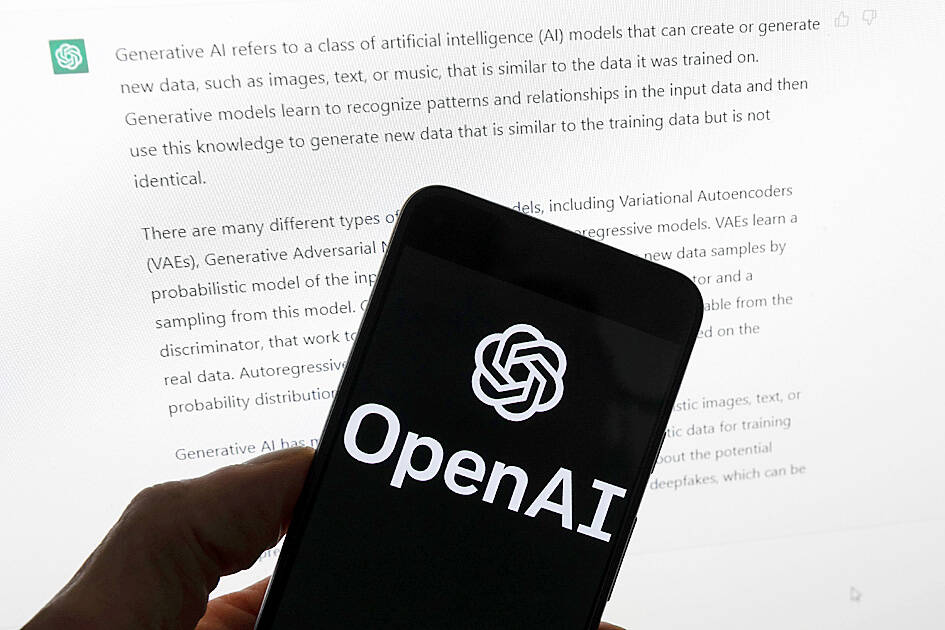The maker of ChatGPT on Thursday unveiled its next leap into generative artificial intelligence with a tool that instantly makes short videos in response to written commands.
San Francisco-based OpenAI’s new text-to-video generator, called Sora, is not the first of its kind. Google, Meta and start-up Runway ML are among the other companies to have demonstrated similar technology.
However, the high quality of videos displayed by OpenAI — some after ChatGPT chief executive officer Sam Altman asked social media users to send in ideas for written prompts — astounded observers while also raising fears about the ethical and societal implications.

Photo: AP
“A instructional cooking session for homemade gnocchi hosted by a grandmother social media influencer set in a rustic Tuscan country kitchen with cinematic lighting,” was a prompt suggested on X by a freelance photographer from New Hampshire.
Altman responded a short time later with a realistic video that depicted what the prompt described.
The tool is not yet publicly available and OpenAI has revealed limited information about how it was built.
The company, which has been sued by some authors and the New York Times over its use of copyrighted written works to train ChatGPT, also has not disclosed what imagery and video sources were used to train Sora. (OpenAI pays an undisclosed fee to The Associated Press to license its text news archive).
OpenAI said in a blog post that it is engaging with artists, policymakers and others before releasing the new tool to the public.
“We are working with red teamers — domain experts in areas like misinformation, hateful content, and bias — who will be adversarially testing the model,” the company said.
“We’re also building tools to help detect misleading content such as a detection classifier that can tell when a video was generated by Sora,” OpenAI said.

Taiwan Semiconductor Manufacturing Co (TSMC, 台積電) last week recorded an increase in the number of shareholders to the highest in almost eight months, despite its share price falling 3.38 percent from the previous week, Taiwan Stock Exchange data released on Saturday showed. As of Friday, TSMC had 1.88 million shareholders, the most since the week of April 25 and an increase of 31,870 from the previous week, the data showed. The number of shareholders jumped despite a drop of NT$50 (US$1.59), or 3.38 percent, in TSMC’s share price from a week earlier to NT$1,430, as investors took profits from their earlier gains

In a high-security Shenzhen laboratory, Chinese scientists have built what Washington has spent years trying to prevent: a prototype of a machine capable of producing the cutting-edge semiconductor chips that power artificial intelligence (AI), smartphones and weapons central to Western military dominance, Reuters has learned. Completed early this year and undergoing testing, the prototype fills nearly an entire factory floor. It was built by a team of former engineers from Dutch semiconductor giant ASML who reverse-engineered the company’s extreme ultraviolet lithography (EUV) machines, according to two people with knowledge of the project. EUV machines sit at the heart of a technological Cold

Taiwan’s long-term economic competitiveness will hinge not only on national champions like Taiwan Semiconductor Manufacturing Co. (TSMC, 台積電) but also on the widespread adoption of artificial intelligence (AI) and other emerging technologies, a US-based scholar has said. At a lecture in Taipei on Tuesday, Jeffrey Ding, assistant professor of political science at the George Washington University and author of "Technology and the Rise of Great Powers," argued that historical experience shows that general-purpose technologies (GPTs) — such as electricity, computers and now AI — shape long-term economic advantages through their diffusion across the broader economy. "What really matters is not who pioneers

TAIWAN VALUE CHAIN: Foxtron is to fully own Luxgen following the transaction and it plans to launch a new electric model, the Foxtron Bria, in Taiwan next year Yulon Motor Co (裕隆汽車) yesterday said that its board of directors approved the disposal of its electric vehicle (EV) unit, Luxgen Motor Co (納智捷汽車), to Foxtron Vehicle Technologies Co (鴻華先進) for NT$787.6 million (US$24.98 million). Foxtron, a half-half joint venture between Yulon affiliate Hua-Chuang Automobile Information Technical Center Co (華創車電) and Hon Hai Precision Industry Co (鴻海精密), expects to wrap up the deal in the first quarter of next year. Foxtron would fully own Luxgen following the transaction, including five car distributing companies, outlets and all employees. The deal is subject to the approval of the Fair Trade Commission, Foxtron said. “Foxtron will be